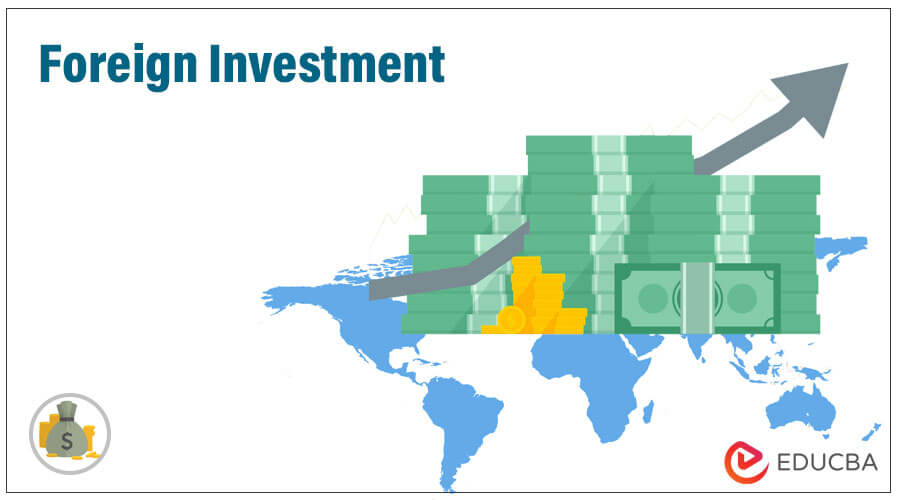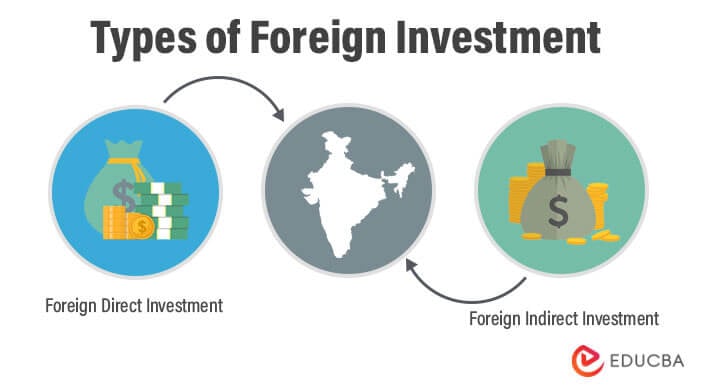Updated July 13, 2023

What is Foreign Investment?
“foreign investment” refers to the flow of capital from one country/ nation to another. As a result, foreign investors gain ownership of the domestic companies of the host countries.
In other words, these investments offer foreign investors an active role in the domestic company’s management through their equity stake, which is large enough to enable them to influence essential business strategies.
Key Takeaways
The following are some of the key takeaways from the article:
- First, it is the investment made by foreign investors in the domestic companies of another country.
- Large multinational companies employ foreign investment to diversify their operational presence, expand the market, and leverage the inherent regional benefits.
- While foreign direct investment refers to purchasing more than a 10% equity stake in a foreign company, foreign indirect investment refers to an investment value that doesn’t exceed 10% of the available stocks in the foreign company.
- It results in a win-win situation for foreign investors and host countries. However, small traders and business owners, at times, are adversely impacted due to such investments.
How Does Foreign Investment Work?
In the last couple of decades, globalization has scaled to newer heights as more and more companies increase their presence in various countries worldwide. Some multinational companies start new production units in different countries to leverage opportunities, such as cheaper production and labor costs. In other cases, these large corporates carry out their businesses in those countries where they enjoy better tax benefits. These countries attract foreign investors by offering favorable tax laws, and multinational companies reap the benefits by relocating their headquarters or parts of their businesses to these countries.
Example of Foreign Investment
Many companies have expanded their offices across the globe to reach out to a larger talent pool. For example, multinational companies like J.P. Morgan, Goldman Sachs, and Morgan Stanley have massive set-ups in Asian countries that primarily capitalize on the cheap labor available in these countries. Further, many textile companies, such as H&M or Zara, whose businesses are focused on the North American market, have their manufacturing units in China and Bangladesh because of significantly cheaper raw materials and labor costs in these regions.
Types
It can be classified into two broad categories:
1. Foreign Direct Investment (FDI)
When a company or individual acquires more than a 10% stake in another company in a foreign country, it refers to foreign direct investment or FDI. In this type of investment, the investor gains controlling power and the ability to influence critical business decisions within the company. It can be further classified into two categories:
- Horizontal FDI: When foreign investors acquire or merge with businesses similar to their own but operating in different countries, it is horizontal FDI. This type of investment aims to get hold of a larger market share to become a global leader.
- Vertical FDI: Vertical FDI is when foreign investors acquire or merge with companies operating in another country and different businesses than the investors. However, the acquisitions are usually part of value chain expansion, such as investing in downstream or upstream companies to gain operational synergy.
2. Foreign Indirect Investment
When a company or individual purchases stocks of a company that is trading in the stock market of a foreign country, but the investment value doesn’t exceed 10% of the available stocks in that company, it is known as foreign indirect investment.
Advantages
The following are some of the significant advantages:
- It increases the host country’s business activities (manufacturing and services), leading to more employment opportunities.
- Foreign investors can access the market of a country other than their own.
- It helps in the infrastructural development of the host country as new business units, and plants are set up.
- It helps develop new technologies and improve operational practices through knowledge sharing between the host country and foreign investors.
Disadvantages
The following are some of the significant disadvantages:
- It can be a risky proposition as it may hinder investment from the domestic players.
- In the case of volatile exchange rates, it remains exposed to significant exchange rate risk, which is a critical factor.
- An unstable political environment may result in unfavorable foreign policies and investment regulations, an essential consideration for foreign investors.
- In many cases, the existing owners of the domestic company have to relinquish control of the company’s business decisions in exchange for foreign investment.
- Small traders and business owners usually find it difficult to survive in a market where this makes an entry. They use aggressive strategies to eliminate the competition and gain the maximum market share.
Why is Foreign Investment Important?
Typically, large multinational companies invest in various countries across the globe to diversify their operational presence, expand the market, and leverage the inherent regional benefits. On the other hand, the host countries tend to attract foreign investors to spur economic growth and infrastructural development. It is a significant economic phenomenon that creates a win-win situation for foreign investors and host countries.
Conclusion
So, it can be said that it marks the entry of foreign investors into other countries. It can trigger economic growth in the host countries by developing infrastructure, creating jobs, sharing knowledge, etc. Further, large multinational companies leverage the foreign investment route to diversify their operational presence, expand the market, and reap tax benefits. In short, it is beneficial to both foreign investors and host countries.
Recommended Articles
This is a guide to Foreign Investment. Here we also discuss the definition, working, example, types, and importance, with advantages and disadvantages. You may also have a look at the following articles to learn more –

